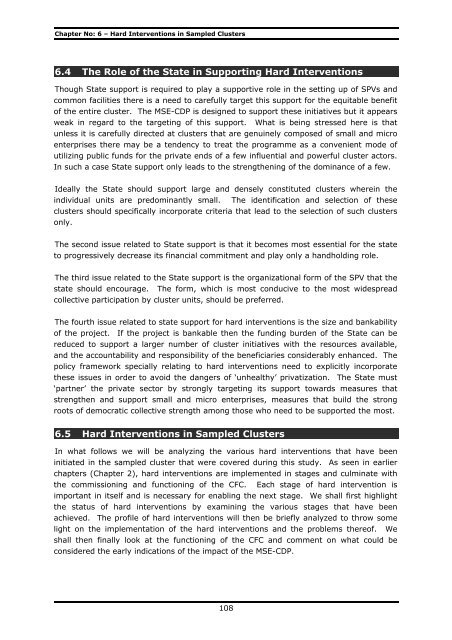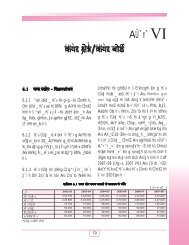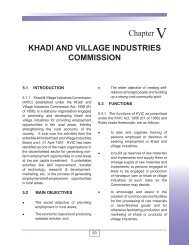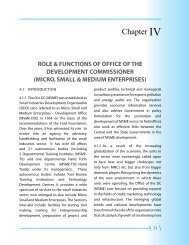Evaluation Study MSE Cluster Development - Ministry of Micro ...
Evaluation Study MSE Cluster Development - Ministry of Micro ...
Evaluation Study MSE Cluster Development - Ministry of Micro ...
You also want an ePaper? Increase the reach of your titles
YUMPU automatically turns print PDFs into web optimized ePapers that Google loves.
Chapter No: 6 – Hard Interventions in Sampled <strong>Cluster</strong>s6.4 The Role <strong>of</strong> the State in Supporting Hard InterventionsThough State support is required to play a supportive role in the setting up <strong>of</strong> SPVs andcommon facilities there is a need to carefully target this support for the equitable benefit<strong>of</strong> the entire cluster. The <strong>MSE</strong>-CDP is designed to support these initiatives but it appearsweak in regard to the targeting <strong>of</strong> this support. What is being stressed here is thatunless it is carefully directed at clusters that are genuinely composed <strong>of</strong> small and microenterprises there may be a tendency to treat the programme as a convenient mode <strong>of</strong>utilizing public funds for the private ends <strong>of</strong> a few influential and powerful cluster actors.In such a case State support only leads to the strengthening <strong>of</strong> the dominance <strong>of</strong> a few.Ideally the State should support large and densely constituted clusters wherein theindividual units are predominantly small. The identification and selection <strong>of</strong> theseclusters should specifically incorporate criteria that lead to the selection <strong>of</strong> such clustersonly.The second issue related to State support is that it becomes most essential for the stateto progressively decrease its financial commitment and play only a handholding role.The third issue related to the State support is the organizational form <strong>of</strong> the SPV that thestate should encourage. The form, which is most conducive to the most widespreadcollective participation by cluster units, should be preferred.The fourth issue related to state support for hard interventions is the size and bankability<strong>of</strong> the project. If the project is bankable then the funding burden <strong>of</strong> the State can bereduced to support a larger number <strong>of</strong> cluster initiatives with the resources available,and the accountability and responsibility <strong>of</strong> the beneficiaries considerably enhanced. Thepolicy framework specially relating to hard interventions need to explicitly incorporatethese issues in order to avoid the dangers <strong>of</strong> ‘unhealthy’ privatization. The State must‘partner’ the private sector by strongly targeting its support towards measures thatstrengthen and support small and micro enterprises, measures that build the strongroots <strong>of</strong> democratic collective strength among those who need to be supported the most.6.5 Hard Interventions in Sampled <strong>Cluster</strong>sIn what follows we will be analyzing the various hard interventions that have beeninitiated in the sampled cluster that were covered during this study. As seen in earlierchapters (Chapter 2), hard interventions are implemented in stages and culminate withthe commissioning and functioning <strong>of</strong> the CFC. Each stage <strong>of</strong> hard intervention isimportant in itself and is necessary for enabling the next stage. We shall first highlightthe status <strong>of</strong> hard interventions by examining the various stages that have beenachieved. The pr<strong>of</strong>ile <strong>of</strong> hard interventions will then be briefly analyzed to throw somelight on the implementation <strong>of</strong> the hard interventions and the problems there<strong>of</strong>. Weshall then finally look at the functioning <strong>of</strong> the CFC and comment on what could beconsidered the early indications <strong>of</strong> the impact <strong>of</strong> the <strong>MSE</strong>-CDP.108
















